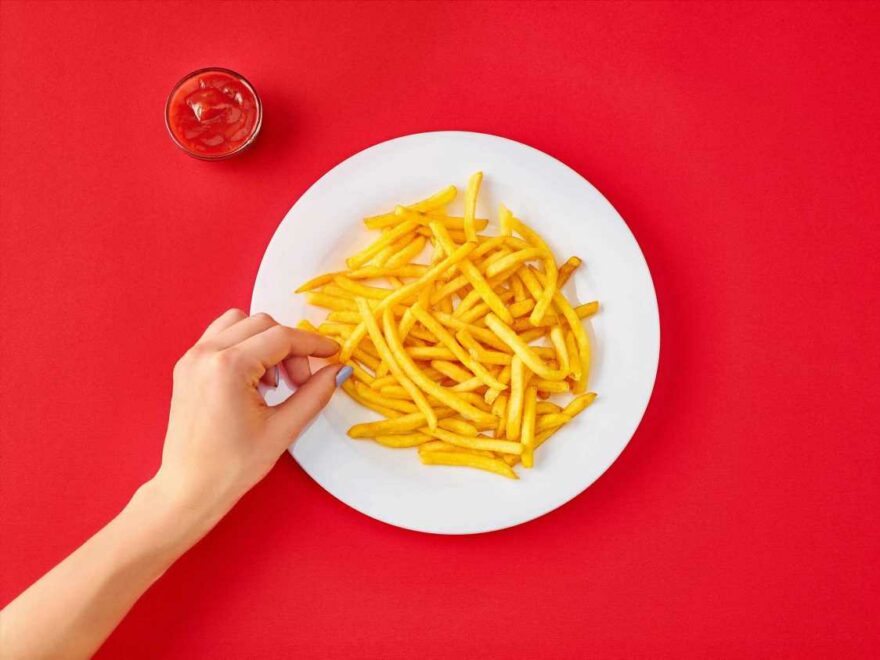DO you know the diet danger zones that can have you unwittingly piling on pounds?
A recent study found we underestimate how fattening food pinched from someone else’s plate can be.
A study for the Journal Of Consumer Psychology found nosh seemed less fattening when shared because you do not feel you own it.
So when you help a friend or partner with their chips, you consider it 18 per cent less fattening than if tucking into your own.
But this if far from the only dietary delusion to look out for.
Here we reveal more, and nutritionist Rhiannon Lambert tells Katy Docherty and Amy Jones how to avoid them.
During lockdown
MANY of us put on weight during the lockdowns as our plans were cancelled and food became even more important.
By May 2020, the nation’s total calorie consumption was 15 per cent above normal levels, according to the Institute for Fiscal Studies.
During the second half of that year, it was still ten per cent up.
RHIANNON SAYS: “Temptations at home are only limited to whatever you’ve got in at the time – so make sure you have healthy snacks such as nuts and fruit on hand.”
Most read in The Sun
STORM TRAGEDY Boy, 9, becomes 2nd victim killed by storm as woman dies in Scotland
Perrie Edwards and Alex Oxlade-Chamberlain thrill fans with pic of baby Axel
Urgent warning to all Brits who had Omicron in December
Brits face 'avalanche' of £70 parking fines after new rules come into force
Office snacking
GRAZING on crisps, sweets, chocolate and cake while sitting at your desk during the working day is quietly adding up.
The damage comes to, on average, an added 2,240 calories a week.
RHIANNON SAYS: “Having the odd indulgence can be really good for you but try to make sure it’s not all the time.
“Work on a food-and-mood diary and ensure you eat balanced meals three times a day, with a couple of snacks if needed.”
Cinema treats
WE all like a snack or three to hand while watching a movie – especially when the action gets tense.
But we end up consuming on average 13,000 calories a year at the cinema, a recent survey found.
RHIANNON SAYS: “Swap crisps for lightly salted or plain popcorn. Popcorn is full of fibre and contains a great deal less salt than crisps.
“Dark chocolate is another great option. It contains iron, magnesium and a great deal more minerals than milk choc.”
Boozy bingeing
AFTER just a few drinks, we are more likely to hanker after high-fat foods.
So even moderate boozing before eating increases calorie intake by 11 per cent, according to a 2015 study in the journal Appetite.
RHIANNON SAYS: “Try to avoid takeaway food after drinking – you will be tempted by the unhealthiest foods.
“It is also best to stop boozing after one drink.
"But if you can’t do that, try alternating drinks of alcohol and water – and don’t drink on an empty stomach.”
Dining out
EATING out is always a treat – especially now that we are allowed to do it again.
But doing this for lunch, rather than eating at home, typically adds 158 calories to your daily intake, a study by the Economic Research Service found.
Dinner out can mean an extra 144 calories.
RHIANNON SAYS: “If eating out, consider going for grilled or steamed options – and swap chips for new potatoes, extra vegetables or salad.
“Also, ask for any dressings and sauces to be served on the side of your plate.”
All-you-can-eat buffets
WITH a variety of tempting food on offer, it is easy to load up.
We can scoff up to a third more, studies have found, while US research found you are likely to opt for fatty foods at a buffet.
RHIANNON SAYS: “Try these healthy hand-portions"
- 1 palm of protein, eg. chicken and fish.
- 1 handful carbohydrate, eg. rice, oats, starchy veg and fruit.
- 2 handfuls non-starchy veg, eg. broccoli, spinach, peppers.
- 1 thumb of healthy fats eg. olive oil, butter, coconut oil and nut butter.
The full moon
THE more spiritual among us believe a full moon can impact on our appetite – and science backs this up.
This is because more lighter evenings can play havoc with sleep and disrupt production of the hormone melatonin – both of which fuel hunger.
RHIANNON SAYS: “Studies show sleep-deprived people have a bigger appetite and tend to eat more calories.
“But a high-carb meal eaten a few hours before bedtime may help you fall asleep faster and improve sleep quality.”
TV dinners
WE all love hunkering down for a TV dinner – feasting on a big, fat meal in front of our favourite programme.
After a hard day’s work, we feel we deserve no less – and will feel much better for it.
But beware. Research from the University of Liverpool found that eating while distracted can increase the amount consumed by up to 25 per cent.
RHIANNON SAYS: “Consider making mealtimes family time by eating together at the dinner table and in an electronics- free zone.”
- Rhiannon is the author of the Sunday Times bestseller The Science Of Nutrition.
Source: Read Full Article









